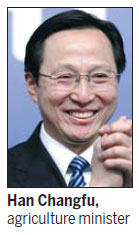High crop yields will help tame inflation
Updated: 2012-03-10 07:56
By Zhou Siyu (China Daily)
|
||||||||

China will continue boosting agricultural production to prevent increasing food prices from driving up the country's inflation rate and putting downward pressure on economic growth.
"The government's economic regulations are faced with pressure from an economic slowdown and rebounding food prices," Agriculture Minister Han Changfu said at a news briefing during the National People's Congress in Beijing on Friday.
China's annual inflation accelerated by 5.4 percent in 2011. In February, though, the figure had eased to a 20-month low of 3.2 percent from a year before, according to the National Bureau of Statistics.
When delivering the government work report on Monday, Premier Wen Jiabao set the country's inflation target at 4 percent for 2012.
"We will increase agricultural production and ensure supply and continue to make controlling excessive rises in food prices a priority in stabilizing prices," Wen said.
The central government plans this year to allocate about 1.2 trillion yuan ($192 billion) to developing the agricultural industry and the country's rural areas and to improving farmers' livelihoods, Wen said. That number had increased by 186.8 billion yuan from last year.
Chinese farmers have increased grain output for eight years in a row. In 2011, the country's grain output increased by 4.5 percent from a year before to hit a record of 571 million tons, an amount that already meets the government's 2020 output target for grain, according to the statistics bureau.
Uncertain weather and market conditions and rising agricultural input costs are the biggest obstacles that might prevent the country from having another bumper harvest, Han said.
Despite the greater production, a sharp increase in imports of farm products in recent years has left the government feeling uneasy.
The value of China's agricultural trade, the third largest in the world, jumped by 27.6 percent from last year to hit $156 billion in 2011, according to the Ministry of Agriculture. Farm products imports increased by 30.8 percent from the previous year to reach $94.9 billion and the value of exports increased by 23 percent to hit $60.8 billion, the ministry said.
As a result, the country's deficit for agricultural trade increased by 47.4 percent from the year before to reach $34.1 billion in 2011, official data showed.
To ensure it has a secure food supply, China has long said 90 percent of the grain it uses should be grown within the country. But Ministry of Agriculture data show that China imported 10.7 percent of all the grain it consumed in 2011.
"If the amount keeps increasing, our national grain security will be compromised," said Chen Xiwen, director of the office for the Communist Party of China Central Committee's Leading Group on Rural Work.
Han said the government will develop agricultural technologies and increase farmers' subsidies to boost production and wean the country off its reliance on the international food market.
More than half of the increases in grain output seen in 2011 were achieved through the use of agricultural technology, Han said. "We will accelerate the extension and development of agricultural technologies in the rural area."
Ren Zhenglong, a member of the NPC Agriculture and Rural Affairs Committee from Southwest China's Sichuan province, said agricultural technology can improve both food production and food safety.
"Agricultural technologies have raised wheat production in Sichuan province, while reducing farmers' use of pesticides," he said. "So food safety risks were also reduced."
Minister Han also said the ministry will try to raise farmers' incomes by 7.5 percent from last year.
But some agricultural experts said the government should continue improving its means of subsidizing farmers.
Given the rising costs of agricultural inputs such as labor and chemicals, "the current subsidies for farmers are still not enough," said Yuan Longping, an eminent Chinese agricultural scientist.
Liu Lu, Liu Xiangrui and Chen Xin contributed to this story.
zhousiyu@chinadaily.com.cn
(China Daily 03/10/2012 page3)

 Relief reaches isolated village
Relief reaches isolated village
 Rainfall poses new threats to quake-hit region
Rainfall poses new threats to quake-hit region
 Funerals begin for Boston bombing victims
Funerals begin for Boston bombing victims
 Quake takeaway from China's Air Force
Quake takeaway from China's Air Force
 Obama celebrates young inventors at science fair
Obama celebrates young inventors at science fair
 Earth Day marked around the world
Earth Day marked around the world
 Volunteer team helping students find sense of normalcy
Volunteer team helping students find sense of normalcy
 Ethnic groups quick to join rescue efforts
Ethnic groups quick to join rescue efforts
Most Viewed
Editor's Picks

|

|

|

|

|

|
Today's Top News
Health new priority for quake zone
Xi meets US top military officer
Japan's boats driven out of Diaoyu
China mulls online shopping legislation
Bird flu death toll rises to 22
Putin appoints new ambassador to China
Japanese ships blocked from Diaoyu Islands
Inspired by Guan, more Chinese pick up golf
US Weekly

|

|







